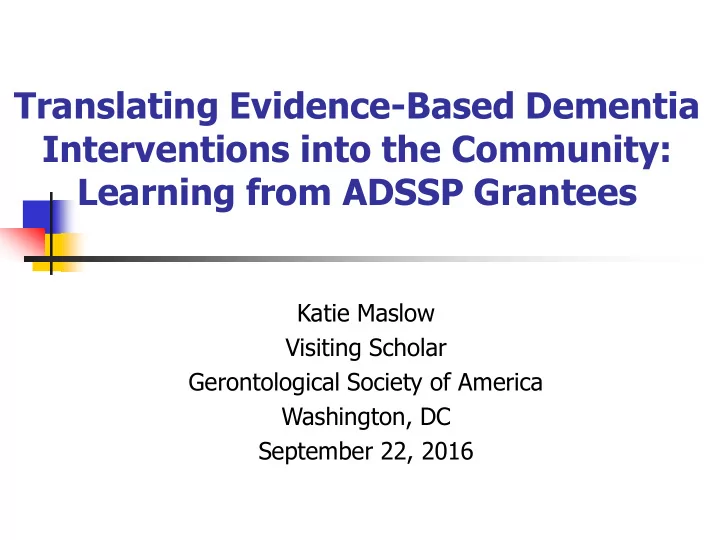

Translating Evidence-Based Dementia Interventions into the Community: Learning from ADSSP Grantees Katie Maslow Visiting Scholar Gerontological Society of America Washington, DC September 22, 2016
Evidence-Based Non-Pharmacological Dementia Interventions Since the late 1990s, randomized controlled trials (RCTs) conducted in the U.S. and other countries have found positive results for 100+ non-pharmacological (non-drug) interventions (care practices and services) for persons with dementia and their family caregivers. More interventions are in various stages of development and testing in the U.S. and other countries. Positive results from RCTs are exciting because they tell us that there is “Something To Do” for people with dementia and their family caregivers.
Steps from Research to Sustained Implementation Research : one or more RCTs show statistically significant positive outcomes for particular care practices and services, which are then said to be “evidence - based” (E -B) Translation : one or more translation studies are conducted to test whether E-B care practices and services also work outside the research setting in “real world” settings Sustained implementation : tested treatments and care practices are provided in the community with non-grant funding; e.g. paid for by a third-party source or a consumer, or embedded in an existing reimbursement program
Translation Studies Intended to test whether E-B treatments and care practices work in real-world, community settings Critical in moving from research to sustained implementation Test effectiveness and feasibility outside the research setting: in larger, more diverse groups of persons with dementia and family caregivers, and delivered by different kinds of agencies and service providers
ACL Support for Translation Studies in Dementia Care From 2008 – 2010, AoA funded 27 grants to states for translation studies to test E-B care practices and services for people with dementia and their family caregivers Grants were made from the Alzheimer’s Disease Supportive Services Program (ADSSP) States used the grant funding to test 9 E-B care practices and services Other funders (the VA, Rosalynn Carter Institute, the National Institute on Aging, and other government agencies and foundations) also funded some translation studies
Outcomes from ACL-Funded Translation Studies
Practice Knowledge and Tools from Translation Studies Vast amounts of new knowledge and insights from real-world implementation of E-B interventions what works and does not work for whom / impact of race, ethnicity, culture, family relationships who will use which interventions / what modifications are needed to increase acceptance, use, and completion of an intervention which agencies and service providers can deliver particular interventions effectively / what modifications are needed to support effective delivery what training, mentoring, supervision, and fidelity monitoring is needed New tools and materials that support sustained implementation Manuals, position descriptions, and training materials and procedures New delivery methods to reduce costs and increase the number of persons with dementia and family caregivers that can be reached and served
Sustained Implementation: Successes to Date Of the 9 E-B interventions: At least one is being reimbursed by Medicare in one Medicare region At least 5 are embedded in OAA Title III-D or III-E-funded programs in several states At least two are being provided by health systems, including at least one being provided by a hospital Several are being provided with funding from the National Family Caregiver Support Program in some states At least two are providing training and tools on a fee basis to 20+ sites each across the country to help the sites implement their intervention The VA is providing at least one intervention in VA centers across the country Bottom line: Valuable outcomes, reflecting substantial ACL involvement, ADSSP funding, and dedicated grantees and partners
Recommend
More recommend